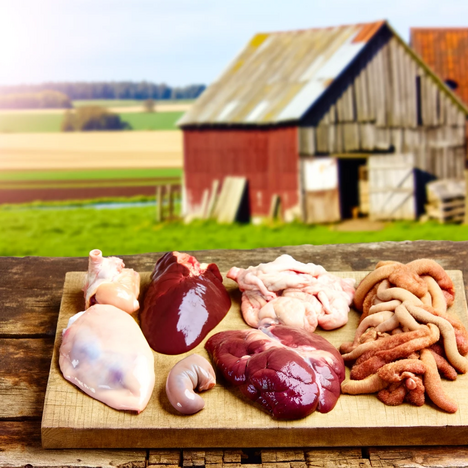Pork offal

Pork offal are the internal organs of the pig, such as the liver, kidneys, heart or stomach. They are often available cheaply and can be a source of many vitamins, minerals and trace elements that are important for your dog's health. But are they safe and how do you prepare them properly? This article will tell you everything you need to know about pork offal for dogs.
What are the benefits of pork offal for dogs?
Pork offal can be a useful addition to dog food, especially if you are feeding your dog barefoot or cooking it yourself. They contain many nutrients that your dog may otherwise not get enough of, such as
- Iron: important for the formation of red blood cells and the transportation of oxygen in the blood
- Zinc: important for the immune system, skin and coat
- Copper: important for the formation of red blood cells, the nervous system and metabolism
- Vitamin A: important for vision, skin and the immune system
- Vitamin B12: important for the formation of red blood cells, the nervous system and metabolism
- Vitamin D: important for bones and calcium absorption
Pork offal is also very high in protein and can help your dog to build and maintain muscle. They are also tasty and can provide variety in your dog's bowl.
What are the disadvantages of pork offal for dogs?
However, pork offal also has some disadvantages that you should be aware of before feeding it to your dog. For one thing, they can be very high in fat and can lead to obesity or digestive problems if you give them too much. On the other hand, they can also contain harmful substances that can harm your dog, such as
- Aujeszky's virus: a virus that causes no symptoms in pigs, but causes a fatal nerve disease in dogs called pseudo rabies. There is no treatment or vaccination against this disease. The virus can be transmitted through raw or undercooked pork meat or offal.
- Salmonella: Bacteria that can cause diarrhea, vomiting and fever. They can be transmitted through raw or insufficiently heated pork meat or offal.
- Trichinella:Parasites that can cause muscle pain, fever and inflammation. They can be transmitted through raw or insufficiently heated pork meat or offal.
How do you prepare pork offal for dogs correctly?
To minimize the risks of pork offal for dogs, you should take some precautions:
- Only buy pork offal from trusted sources that have been tested for Aujeszky's virus. Avoid giving your dog offal from wild boar.
- Always cook or roast pork offal thoroughly (at least 30 minutes at a minimum of 55 degrees Celsius) to kill any viruses, bacteria or parasites.
- Remove excess fat and tendons from the pork offal.
- Cut the pork entrails into small pieces or puree them to prevent ingestion.
- Give your dog only small amounts of pork offal (no more than 10 percent of the total food ration) and mix it with other ingredients such as vegetables or rice.
- Monitor your dog after eating pork offal for any signs of intolerance or illness.
Pork offal can be a nutritious and tasty addition to your dog's diet if you prepare it correctly and feed it in moderation. They can provide your dog with many important nutrients that he needs for his health. However, you should also be aware of the potential risks of pork offal for dogs and avoid giving your dog raw or undercooked offal, which could contain Aujeszky's virus, salmonella or trichinae.
If you notice any signs of hypersensitivity or poisoning in your dog, you should see your vet immediately. We are not a substitute for a vet, but we try to be as accurate as possible. Every dog reacts differently and we recommend you get a second opinion or consult your vet if in doubt.
Stay healthy and take good care of your four-legged friend!😊